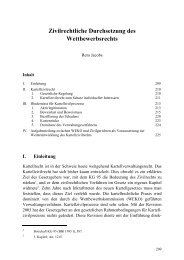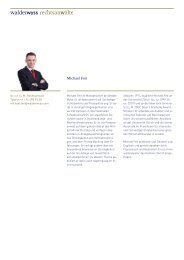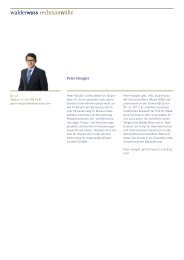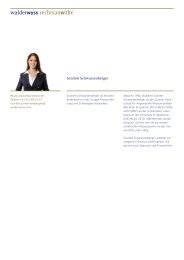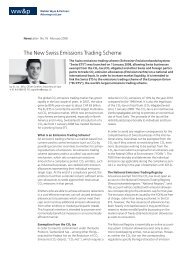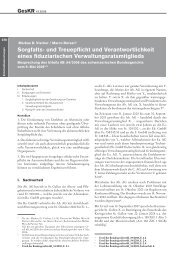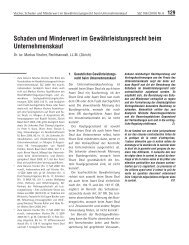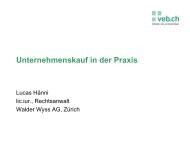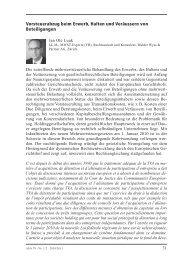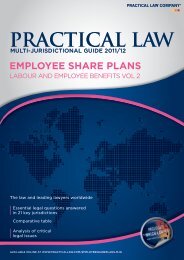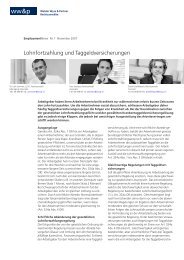Judgment of 7 March 2012 - Walder Wyss Ltd.
Judgment of 7 March 2012 - Walder Wyss Ltd.
Judgment of 7 March 2012 - Walder Wyss Ltd.
Create successful ePaper yourself
Turn your PDF publications into a flip-book with our unique Google optimized e-Paper software.
A-6537/2010<br />
refund application is first rejected by the SFTA but subsequently granted by the Federal<br />
Administrative Tribunal, there is no obvious reason why no interest should be payable for the<br />
period <strong>of</strong> delay attributable to the SFTA. Referring to art 168(2) <strong>of</strong> the Federal Act <strong>of</strong><br />
14 December 1990 on Federal Income Tax (FITA, Bundesgesetz über die direkte<br />
Bundessteuer, DBG, SR 642.11) the complainant further contends that Swiss tax law also<br />
provides for the payment <strong>of</strong> interest where too much tax has been paid and is subsequently<br />
refunded. Moreover, the complainant states that it is not claiming compensatory interest so<br />
much as default interest, the reason being that, were the tribunal to uphold the complaint, the<br />
SFTA ought to have granted the refund applications rather than rejecting them and hence<br />
should have made the refunds. The complainant argued that art 108(3) CO—whereby the<br />
debtor is considered in default, without any time limit being set, from the point in time at which<br />
his performance is due—could justifiably be applied to this case. The complainant maintains<br />
that the SFTA was actually in default from an earlier date, namely 8 July 2008, when the SFTA<br />
was set a time limit in which to hand down a contestable decision.<br />
Contrary to the complainant’s view, the SFTA was not in default in respect <strong>of</strong> the refund<br />
applications either from 8 July 2008 or from 29 July 2010, the date on which the contested<br />
decision was handed down, or from 13 September 2010, the date on which the complaint was<br />
lodged. it is important to note that, pursuant to art 3(2) and (3) O-DTC-DK, the SFTA is required<br />
to issue a decision or decree establishing the withholding tax to be refunded, if any.<br />
Consequently, the SFTA may be said to be in default <strong>of</strong> the relevant payment only once its<br />
refund obligation has been established by means <strong>of</strong> an order that has entered into force. Such<br />
an order may be handed down by the SFTA itself or by a higher instance (Federal<br />
Administrative Tribunal or Federal Supreme Court) (cf. art 3(4) O-DTC-DK). The SFTA can owe<br />
interest on the refundable withholding tax for the period prior to the entry into force <strong>of</strong> said order<br />
only if compensatory interest is expressly provided for.<br />
Unlike default interest, compensatory interest is not conditioned on the SFTA’s being in default<br />
(judgment <strong>of</strong> the Federal Supreme Court 2C_191/2007 <strong>of</strong> 11 October 2007 cons. 3.2).<br />
Compensatory interest is payable where excess tax has been paid and the excess is therefore<br />
to be refunded. It is payable from the juncture at which the refund ought to have been made.<br />
However, compensatory interest is only ever payable where statutory provision is made for it<br />
(judgment <strong>of</strong> the Federal Supreme Court 2C_410/2008 <strong>of</strong> 20 October 2008 cons. 3.2; decision<br />
<strong>of</strong> the Federal Administrative Tribunal A-6971/2008 <strong>of</strong> 8 June 2009 cons. 5.5 with refs.). There<br />
is no provision for compensatory interest in the DTC-DK. Article 168(2) 2 FITA cannot possibly<br />
serve as the legal basis for such interest in this case, since that provision relates to Federal<br />
income tax. What is more, art 31(4) WHTA explicitly states that no interest is payable on<br />
amounts to be refunded. In the instant case there is no reason to take a different approach to<br />
refunds under the DTC-DK. Moreover, the judgment <strong>of</strong> the German Federal Fiscal Court<br />
(Bundesfinanzh<strong>of</strong>, BFH) <strong>of</strong> 29 October 1981 (I R 142/78), which was submitted by the<br />
complainant, is <strong>of</strong> absolutely no relevance to the instant complaint proceeding. Merely for the<br />
sake <strong>of</strong> completeness the tribunal points out that, in said judgment, there was a legal basis on<br />
which the BFH could found its view that compensatory interest was payable. In the instant case<br />
no such legal basis exists. On this point the complaint is therefore rejected.<br />
8.3. Further, the complainant criticises the length <strong>of</strong> the refund proceedings before the SFTA. It<br />
filed its refund application for dividends falling due in 2007 on 2 August 2007 and for dividends<br />
falling due in 2008 on 29 July 2008. The SFTA decision on these applications was made on 29<br />
July 2010. The duration <strong>of</strong> the proceedings—approximately three and two years respectively—<br />
no longer appears to be short. It must be remembered, however, that the instant case turns on<br />
Translation © <strong>Walder</strong> <strong>Wyss</strong> <strong>Ltd</strong>. 20 / 23



